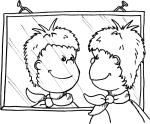


Introduction
Reflexive pronouns in German grammar are mich/mir, dich/dir, uns, euch and sich. We use them with reflexive and reciprocal verbs. Reflexive pronouns always refer to the subject and must be declined to match the case they are in.
Learn how and when to use reflexive pronouns with Lingolia’s free online lesson. In the exercises, you can practise what you have learnt.
Table of Reflexive Pronouns in Accusative and Dative
Use the following table of reflexive pronouns in the accusative and dative cases to help you learn German reflexive pronouns.
| ich | du | er/sie/es | wir | ihr | sie/Sie | |
|---|---|---|---|---|---|---|
| accusative | mich | dich | sich | uns | euch | sich |
| dative | mir | dir | sich | uns | euch | sich |
Usage
We use reflexive pronouns with two different types of verbs in German grammar:
- Reflexive verbs use the reflexive pronouns with the meaning “oneself”. We use the reflexive pronoun in the dative if there is also an accusative object. (see also Reflexive Verbs)
- Example:
- Ich dusche mich.
- Ich putze mir die Zähne.
- Reciprocal verbs use the reflexive pronouns with the meaning “each other”. Therefore, we can only use reciprocal verbs in the plural. These verbs include among others: sich kennen, sich sehen, sich lieben, sich streiten, sich einigen
- Example:
- Ich glaube, wir kennen uns. (= wir kennen einander)
- Tom und Albert streiten sich. (= der eine mit dem anderen)
 |
 |
| Ich sehe mich. (I see myself in the miriror – reflexive) |
Wir sehen uns. (we see one another; you see me, I see you – reciprocal) |






